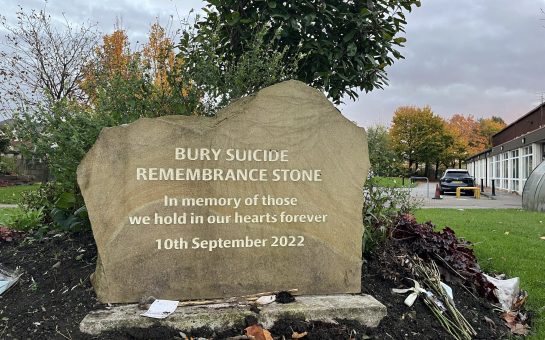A Salford University professor has spoken out in support of patients’ right to die following last week’s news that euthanasia and assisted suicide will not be legalised in the UK.
Professor Martin Johnson, a professor in nursing and cowriter of Nursing Power and Social Judgement, has spoken out in favour of the heated debate.
Although he understands why the appeal failed, Professor Johnson believes doctors and nurses should be allowed to perform assisted suicides as a form of palliative care.
“I think the denial of the appeal is understandable for the moment, but sad,” he said.
“Eighty per cent of the public believe that assisted suicide should be an option in the right circumstances.”
According to Professor Johnson, the previous Director of Public Prosecutions Kier Starmer, made good progress by protecting friends and relatives in circumstances of assisted suicide.
But the new guidance refers to friends and relatives who have nothing to gain personally – which could not happen in any professional context.
The original case was championed by right-to-die campaigner Tony Nicklinson, who was left suffering from locked-in syndrome following a stroke in 2005.
Mr Nicklinson’s wife Jane, was one of three to appeal against the court’s decision not to legalise assisted suicide in the UK – an appeal that was quashed by the Supreme Court on Wednesday.
“Given that a main aspect of care of the dying is relief of suffering and the respecting of their autonomous choices, this is a real problem,” Professor Johnson said.
He believes English law should allow for similar steps as the Swiss ‘Dignitas’ model.
This allows the terminally ill to administer a lethal dose of barbituates themselves, with the helper only making arrangements and providing transport.
“This would be a good step,” he admitted.
“I would certainly want such an option to be available for myself and those I care about, so it would be hypocritical to refuse this for others.”
But the Pro-Life Alliance points out that Els Borst, famous for proposing the Netherlands’ euthanasia bill during her time as the country’s Health Minister, later went back on her decision.
During interviews for a book by Dr Anne-Mei The about the history of euthanasia, she said the move was made ‘far too soon’ and that the Netherlands’ palliative care was in fact not up to scratch.
She was recorded as saying: “In the Netherlands, we first listened to the political and societal demand in favour of euthanasia. Obviously, this was not the proper order.”
In Dr The’s book, Verlossers naast God, she cited that nearly all the doctors she’d encountered had struggled with their own moral issues and emotional reactions surrounding euthanasia.
This throws up the opposite – and often less considered – side of the ethical coin.
What ethical problems might a change in legislation cause for healthcare professionals, who if assisted suicide was legalised could be required to end lives in a professional capacity?
Professor Johnson, who lectures on nursing ethics, said: “I do think that most doctors and nurses are sympathetic to doing what a patient wants within the law.
“Of course, some might seek a ‘conscientious objection’ clause, as is the case with abortion.
“The sensible course is for such professionals to avoid settings in which these decisions are likely to be regularly made.”
Professor Johnson added: “Jehovah’s witnesses don’t agree with the giving and receiving of blood products, but to impose their position on patients with a different view would be ridiculous.”
Also battling for the right to die in the appeal were Paul Lamb – a car crash victim left in constant pain and needing round the clock care – and another locked-in sufferer named only as ‘Martin’.
Their appeal was based on the ‘necessity’ defence, allowing for situations of such overwhelming urgency that breaking the law becomes an acceptable response.
Mrs Nicklinson, Mr Lamb and ‘Martin’ argued it was possible for there to be overwhelming urgency for death, in which case the ‘necessity’ loophole could be applied.
But the Pro-Life Alliance disagrees, saying the UK leads the world in palliative care and is improving year by year.
Their website claims: “Many of the claims by pro-euthanasiasts – for example that Motor Neurone Disease sufferers will choke to death – are irresponsible scare-mongering.”
Mr Nicklinson lost his fight to make it legal for a doctor to help him die, but died just days after the 2012 verdict.
Dr Alexandra Mullock, a Medical Law lecturer at the University of Manchester, said: “[Mr Nicklinson] was unable to do the most basic tasks we all take for granted. Even feeding himself was impossible.”
But she added that the court’s original verdict was ‘unsurprising’.
She explained that this appeal did not succeed because trying to impose the necessity defence on such a ‘complex and controversial’ field was not appropriate.
“Judges might be influenced by their own particular moral perspectives,” she said.
“There would be a danger that any particular decision – influenced perhaps by sympathy for an individual – may have unforeseen consequences, creating an unfortunate precedent which may have a negative impact on vulnerable people.”
What Dr Mullock refers to is the ‘slippery slope’ concern.
Some people believe that legalising euthanasia and assisted suicide trivialises the worth of human life, and there are worries it might open the door to a range of dangerous consequences.
For example, those with illnesses or disabilities which mean they require constant care may feel pressured to request euthanasia, and having it there as an option might discourage research into other palliative care.
The Pro-Life Alliance said: “Legalising the negative quick-fix of assisted suicide would inevitably lead to a deterioration in palliative care for those with incurable conditions.
“[Palliative care patients] are overwhelmingly opposed, as are [their] doctors – not just here but worldwide – to any relaxation of the law protecting them.”
But Professor Johnson says he does not believe in ‘slippery slope’ arguments.
“Rational societies should be able to move along a continuum of decisions in relation to the evidence and legal processes,” he said.
“There is enormous suffering in and around the end of life. We should be able to put these decisions in the hands of the people who are dying, or enduring lifelong privation and suffering.
“Provided they are the deciders in a clear framework I see little risk of abuse.
“Certainly none worse than the merciless pain and difficulty some people go through, even with modern palliative care available.”
Image via Sam Caplat, with thanks



